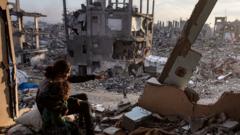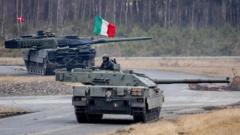Recent developments highlight the complexity of the situation in Gaza and the West Bank, including a U.S. proposal for control of Gaza, the impact of hostages exchanges, and the resurgence of violence against Palestinian villages.
Escalating Tensions in Gaza and the West Bank: A Multifaceted Crisis

Escalating Tensions in Gaza and the West Bank: A Multifaceted Crisis
The ongoing conflict in the region raises crucial questions about international intervention, humanitarian concerns, and local responses.
The situation in Gaza and the West Bank is increasingly complex, as escalating violence continues to disrupt the lives of civilians. In a surprising twist, former President Donald Trump has indicated a proposal for the United States to take control of Gaza, igniting mixed reactions from both Palestinians and Israelis. On one hand, while some see this as a potential pathway to stability, others are skeptical about foreign intervention based on historical precedents.
Amidst discussions of U.S. involvement, several recent incidents highlight the ongoing tensions. Three Israeli hostages were released in exchange for 183 Palestinian prisoners, an exchange that reflects both the desperation for peace and the intertwined fates of those affected by the conflict on both sides. This move has been met with a range of reactions—some celebrating the return of hostages, while others criticize the implications for Palestinians still in captivity.
The humanitarian crisis remains dire, particularly as reports indicate that Israeli settlers have attacked Palestinian villages in the West Bank. This violence further complicates the already fraught relationship between communities and may threaten ongoing cease-fire negotiations.
In the wake of Israeli airstrikes, Palestinians have mourned the loss of life, emphasizing the emotional and societal toll inflicted by the conflict. Concurrently, reports of Gaza's recovery efforts are underway, as displaced individuals seek to reunite with their families amidst reports of destruction.
Meanwhile, the United Nations Relief and Works Agency (UNRWA) has voiced concerns that any efforts to ban the agency could sabotage the fragile cease-fire, underscoring the importance of international support in alleviating the humanitarian crisis.
As the international community watches closely, the dynamics in Gaza and the West Bank will continue to evolve, with significant implications for peace and stability in the region. The ongoing exchange activities between Israel and Hamas, alongside calls for humanitarian assistance and political dialogue, will be crucial in understanding the future landscape of this conflict.






















